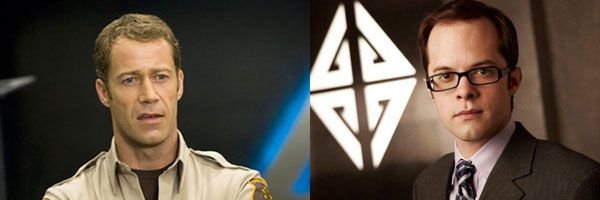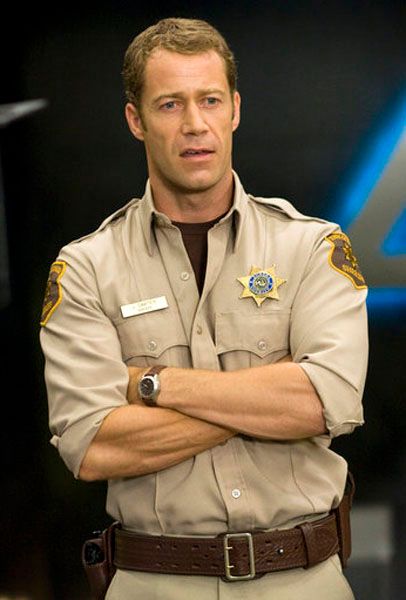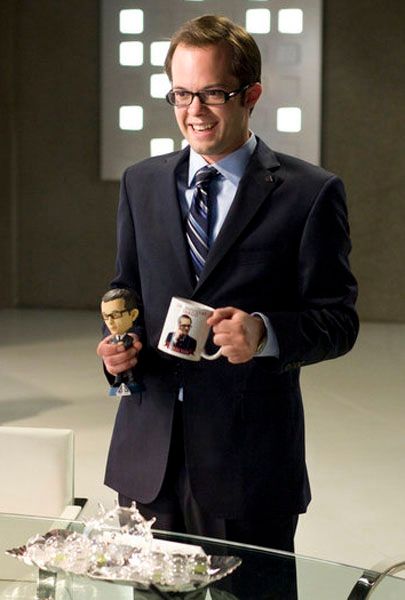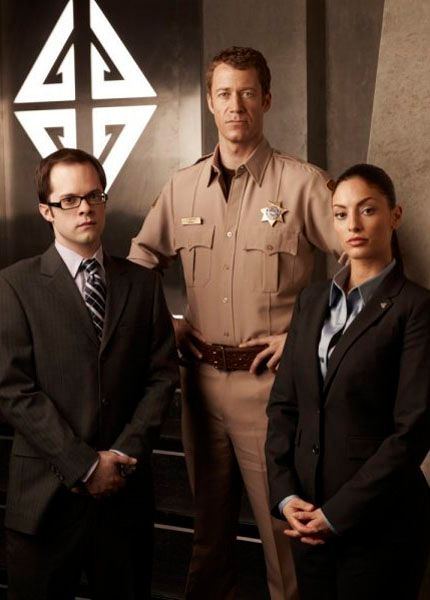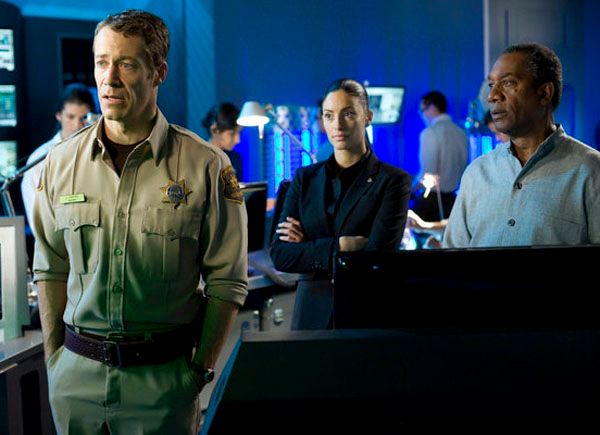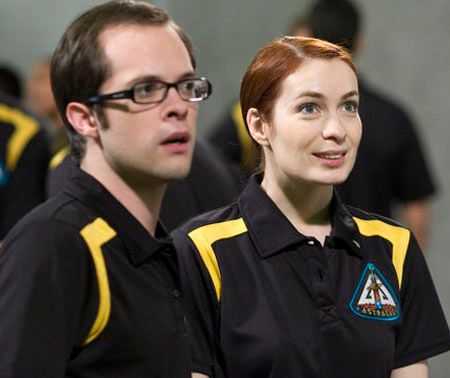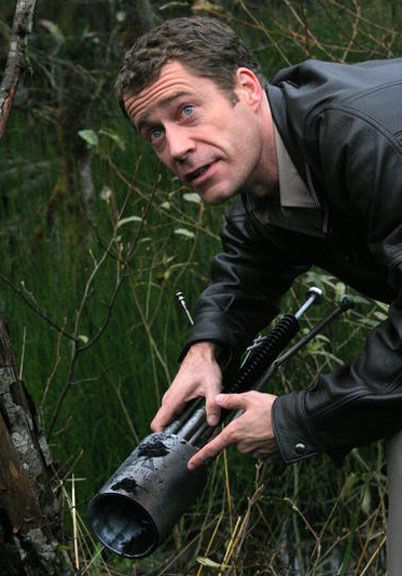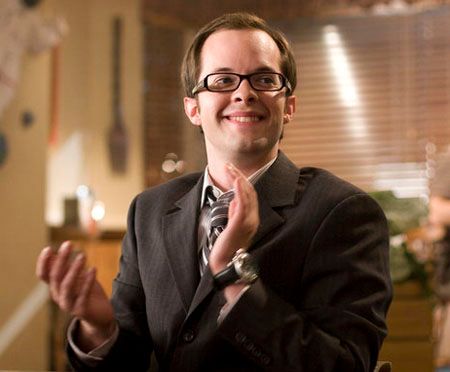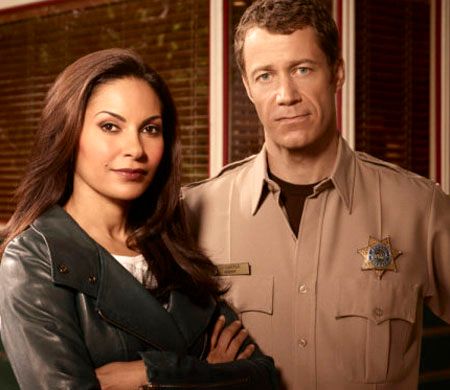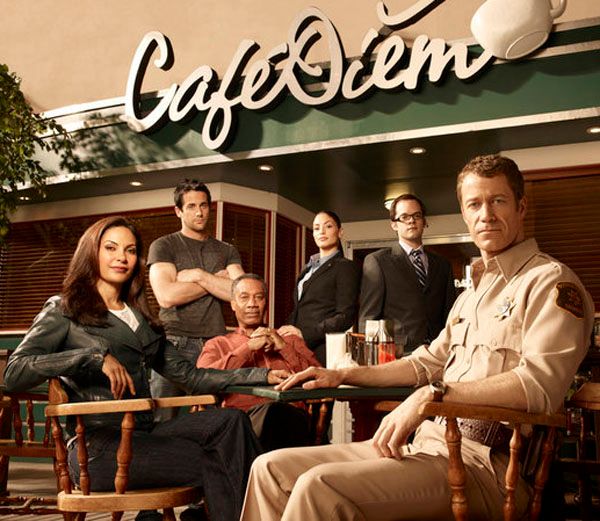The fifth and final season of the popular series Eureka, currently airing on Monday nights on Syfy, kicked off by letting viewers know where the missing Astraeus and her flight crew has been and reinforcing the fact that things are rarely ever quite what they seem in this small, quirky town. After premiering as Syfy’s most popular scripted series in 2006, it has gone on to generate numerous accolades and a devoted following that loves the secret community of geniuses who conduct top-secret research in a place where anything imaginable can happen. The series stars Colin Ferguson (Sheriff Jack Carter), Salli Richardson-Whitfield (Allison Blake), Joe Morton (Henry Deacon), Erica Cerra (Jo Lupo), Neil Grayston (Douglas Fargo) and Niall Matter (Zane Donovan).
While at the recent NBC Universal summer press day, co-stars Colin Ferguson and Neil Grayston talked to Collider for this exclusive interview about what they thought of the final season, how they never could have imagined where the story and characters would end up, what the final day on set was like, the mementos they were able to keep, what they’ll miss most about their characters, and which Eureka gadgets they wished they had in their own life. Ferguson also talked about his new pilot, Like Father, that was created by Bill Lawrence (Cougar Town, Scrubs), and Grayston talked about the possibility of Fargo returning to Warehouse 13, as well as doing a sci-fi movie with Greg Grunberg (Heroes), called End of the World, about two video store employees who have to save the world with their knowledge of disaster movies.
Collider: When you guys found out where things would be going this season, what was your reaction?
COLIN FERGUSON: I thought it was really cool. I loved it so much. I thought the matrix was a wonderful idea. The problem with a season that arcs towards a ship disappearing is that you’re duty-bound to deal with it. Yawn! What’s it gonna be? The ship is gone forever? You can’t do that because there are people on it. So, when do we find them? Are they hurt?
NEIL GRAYSTON: The ship is lost in space, and then, all of a sudden, we’re Stargate Universe somehow.
FERGUSON: We’ve got to get them back, so it’s really anti-climactic. But, to put this great twist on it, where it wasn’t lost, it was stolen, is like, “Woah!” It was a really nice turn. I thought it was a great choice.
Does anything go, this season?
GRAYSTON: I think Episode 2 of Season 5 has a really shocking moment that informs a lot of stuff for the rest of the season. We threw so much into it for Season 5. The laughs are laughier.
FERGUSON: And the dark moments are darkified.
Looking back to when you signed on to do this show, could you ever have imagined that things would end up where they do?
FERGUSON: No. When we signed on to do this show, and over the first year, we were told, in no uncertain terms, “This is a drama. Don’t be funny. Don’t put that in. And, there are two things the show will never do: We will never deal with space and we will never deal with aliens.” We didn’t deal with aliens, but we definitely dealt with space and we’re definitely a comedy. So, to see where it is now, as per where it started, no, I never thought it would go like this. And, I never thought I would be as happy with it, as I am with this particular last season. This last season is the best thing that we’ve done, and I’m grateful to have been able to play a part in helping it get on.
GRAYSTON: On a personal level, I was only signed on to be in seven episodes, as the assistant. If you would have told me, when we started out, that I would be head of Global Dynamics, I wouldn’t have assumed that. I would have maybe hoped, in some weird alternate future, that that would happen, but it ended up actually happening. That was cool.
Do you have a favorite episode or moment from this season?
GRAYSTON: There are so many. I haven’t actually seen the episodes, and it’s been so long since we filmed them. I’ve been waiting to watch them when everyone else gets to see them, just ‘cause I want to go on Twitter and see what people are thinking, as it happens. But, doing my Colin Ferguson imitation is probably one of the more fun moments on the show.
FERGUSON: The episode is called “Jack of All Trades,” and it’s a body-swapping episode where we end up inhabiting each other’s bodies. (Show co-creator) Jaime [Paglia] directed that episode. It was so much fun to take six years of pent-up aggression for each other and do impressions of each other. That was really fun.
Did you work with each other at all, to get your impressions right?
FERGUSON: We really wanted to prep it, but for some reason, things went squirrely and a bit sideways on us in production and it got bumped up and, all of a sudden, we had to shoot it, so we literally had no time. It was a really late night, the night before, for me, anyway. There was no sleep and I had to do an imitation, and I was like, “Oh, I guess I’m winging it.”
GRAYSTON: Eventually, I did get Colin to say the lines that I was supposed to say, as him, and we swapped. That was really confusing.
FERGUSON: Because you’re so comfortable in your character and on set, and you own it, to jump into another character, you feel like you’re on a show for the first episode, where you’re a little insecure and you’re like, “Did that work? That was too far. Oh, no, they have to save me in editing? I don’t like it when they have to save me in editing!” There was a little bit of that.
Colin, what was it like to explore the Carter/Lupo relationship this season?
FERGUSON: It was odd. Making out with a friend of yours is always a little odd, but awesome! Poor Erica [Cerra]. She’ll never have that again, so I don’t know how she’s coping. She’s still in the throes of depression. No. It was really fun. We’d been leaning into it, jokingly, for awhile. Her big thing is that she’s kissed everybody on the show, so she was like, “Oh, come on! Why do I have to kiss absolutely everybody?!” But, it was really, really fun. There were some great scenes that are really, really fun, and I had a great time doing them.
Neil, was it fun to get to learn more about Fargo through his relationship with Holly (Felicia Day)?
GRAYSTON: Yeah, it was really fun! Felicia is just awesome to work with. She’s so easy. She just gets it. So, it was a really simple thing to do, and it was a lot of fun. That whole thing gets really interesting this year. There’s a lot of really cool stuff with that, that I can’t, of course, speak of.
FERGUSON: But, it’s really fantastic. Neil has these really nice, really great dramatic moments. It’s really fun.
Has it been easy to do the balance of comedy and drama with this show?
GRAYSTON: It was written more dramatic in the beginning, but we’re generally pretty comedic people, so I think the comedy was informed by the people that they cast. Me and Colin, especially, work very similarly. If a scene is really dramatic, we’ll try to lighten it up a bit. If a scene is written too funny, we’ll probably try to dramatic it up a bit. That’s just how we work. The cast was just like that, and the writers are like that. I don’t think there was really a difficulty in setting that tone.
FERGUSON: No, it was a really natural thing for us. The thing that takes time is getting every part of the creative process on the same page. You have directors come in, and they have their own agenda. They’ll say, “This is hilarious! Do it like this!” And you have to gently say, “Okay, that’s not actually the right tone.” We ended up doing a lot of fighting for our characters and fighting for the tone of the show, which is just the nature of the beast. It’s not the most fun bit, but it happens. There was a growth period, but it’s what we wanted it to be.
What was your last day on set like?
FERGUSON: I was caked in blood, all over my clothes, and with a fake prosthetic arm from the accident. No. It was great. We knew it was coming, at that point, so we had three weeks to get through it. The last day was neither here nor there. It was more the last scene with any one person.
GRAYSTON: Whenever you’d hear on the radio, “That’s a series wrap on . . .,” it was just like, “Wow! There are no reshoots. They’re not coming back. This is the last time they’re filming, on this stage.” In some cases, some of the sets were torn down, literally right after they finished a scene there. The sheriff’s office was gone before the end of the day.
FERGUSON: You had so much of that, leading up to the end, that the end was almost a release.
Were you able to take any mementos from the set?
FERGUSON: Herpes! I have that with me forever. No.
GRAYSTON: I got my parking sign.
FERGUSON: You did? That’s cool. That’s a good idea. I grabbed my desk nameplate that said, “Sheriff Carter,” ‘cause it’s from my favorite set, which is the sheriff’s office.
Colin, when you directed episodes of the show, did you learn things about your co-stars, working with them from that perspective, that surprised you?
FERGUSON: When I directed, nothing surprised me. Everyone was wonderful with me, and everybody was as good as I hoped and thought they would be. Everybody did exactly what I had hoped, and we all got along really, really, really well.
GRAYSTON: Because he had worked with everyone in an acting capacity, he knew what our strengths and weaknesses were already, going into it. That was really cool, to have that, as a director.
FERGUSON: And I got to go in and give them that autonomy. I didn’t need to say anything. You have so many directors who come in and yammer away, but all I have to do for Neil is say, “Hey, Neil, I want to put the cameras over here. I’m thinking you’re at your desk.” And he’s like, “Of course, I’m at my desk.” And, it’s just done. That’s the wonderful thing with being able to come on set and just let people do what they do.
Neil, how much fun was it to have Wil Wheaton as a nemesis?
FERGUSON: What a dick!
GRAYSTON: It was awesome! The best part about Wil Wheaton is that he’s totally not a dick, so it’s perfect to have him playing one. We get along really, really well. I’ve always found that it’s actually easier to pretend to not get along with someone that you really like than it is to not get along with someone that you actually don’t get along with because then you’re not engaging. Wil is super-wicked awesome.
Are there things that exist in the world of the show that you wish you could have for yourself, in your own life?
GRAYSTON: Whenever that question is asked, I always say Zane’s sky bike because I think that would be cool. But, no, the coolest thing in Eureka is Sarah. That would be awesome to have.
FERGUSON: Teleportation would be good. I’d go to a lot more places. I’d be like, “I’m going to pop over to Mars.”
Is there anything that you’re going to miss most about playing these characters?
FERGUSON: I’ll miss the autonomy. Six years in, we knew what we were doing. We were trusted to preserve the tone. You go on a new show and everyone has an opinion, and you go, “Oh, I’m not in that same position anymore,” where it’s that smooth running machine.
GRAYSTON: Because we’ve now established that the Warehouse 13 and Alphas universes are the same universe as Eureka, it doesn’t necessarily mean the end of all the characters. That’s always a possibility.
FERGUSON: I’d spin Fargo off. He’s the most spin-offable.
GRAYSTON: It could be Fargo’s Ninja School.
Neil, would you be up to returning to Warehouse 13?
GRAYSTON: Yeah, it would be fun to go back to it and do all that. I like filming with them. There’s good people over there.
What have you guys learned about yourself as actors, from having been on this show as long as you have?
GRAYSTON: That was like my school, basically. When I think back to how little I actually knew, when we did the pilot versus what I know now, it’s insanely gigantic. I used to still be nervous with the camera. Just that one big lens was very distracting to me. Now, I don’t even notice it, except for when I know it’s going to be moving and I have to move at a certain place with it, so that the focus doesn’t go soft or hard and I can do everything I can to help the camera guys out. They don’t have acting schools that teach you how to do the technical stuff. There’s plenty that have theory of acting and the emotional stuff.
FERGUSON: Yeah, there’s nothing that actually helps you take the emotional arc that you’ve sculpted and learn the politics of how to get it on the screen. There’s some politics involved with that. Before this, I would bemoan and go, “I can’t believe that actor is on another show. Why don’t they get someone new?” But, unless you’ve been in a show, you don’t really get how much you learn on a show. Now, I get it. When someone comes off a show and goes onto another show, if I was a big company, I’d go, “Yeah, they know what they’re doing. We can use them again.” That’s just a testament to how much we’ve learned. We went through the war together, in a sense.
Do you guys know what you’re going to do next?
FERGUSON: I’d love to do more directing. I will do more directing. I did a pilot called Like Father, with Bill Lawrence. That went well. It’s in the edit room now. It’s a pilot, so fingers crossed because who knows, but it felt okay.
GRAYSTON: I did a sci-fi movie with Greg Grunberg, called End of the World, about the end of the world. Surprise! I think that’s going to be out this year, but you never really know. Sometimes things get delayed for effects reasons, and stuff like that. It was a tongue-in-cheek look at disaster movies. We play two video store employees who have to save the world from disaster with their encyclopedic knowledge of disaster movies.
FERGUSON: So, it’s the Scream of disaster movies?
GRAYSTON: Yeah. That was a lot of fun, and it was hectic.
Colin, did you intentionally look for something so different to do after this show?
FERGUSON: Yeah. We have the luxury of time, having been on a show for six years. Prior to this show, you took whatever came along. You wanted a gig. Now, we in this great position of actually being able to ask yourself, “Do I want to do this?” Not that you’d exploit that, but it’s a nice position to be in. It feels very rich, in a full sense. You’re like, “Wow, is this really where I am, or am I just completely deluded?”
Was it weird to adjust to doing something where you don’t have effects and houses talking to you?
FERGUSON: No because we had so many scenes that were very naturalistic on the show.
GRAYSTON: I think the weirdest is when I’ll get sides for an audition and I have absolutely no scientific talk in it and I’m like, “Surely, it can’t be this easy!”
FERGUSON: Eureka was a hell of a training ground. There’s a pecking order. There’s films, TV, network and cable, unless you’re on a specialty cable show. The misunderstanding is that the top one is harder and the bottom one is easier. We were such an ambitious show. We only had seven days to shoot it and we didn’t have a ton of money, so you had to do all that stuff as quickly as you could possibly do it and it behooved everybody to learn. It was a all-hands-on-deck show.
Eureka airs on Monday nights on Syfy.

